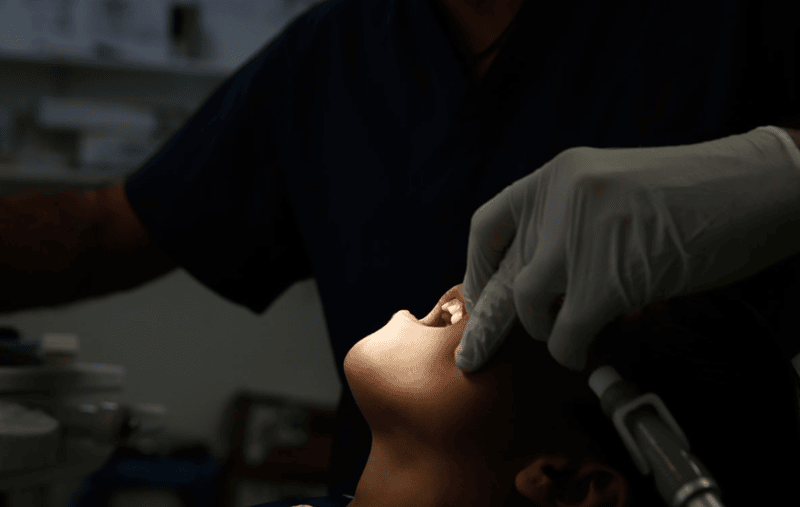Dental care in Kenya: High costs and tradition limit access to essential oral health services

According to the World Health Organisation (WHO), over 480 million people in the African region struggle with oral health issues.
Growing up, Roseline Wangeci only visited the dentist when she had severe toothache. These visits typically resulted in either tooth extractions or injections, while more complex procedures, such as routine check-ups, were seen as too costly – a view she continues to hold today.
"The last time I visited a dentist was as a child. As an adult, I’ve never gone, despite having dental issues and cavities. However, they haven’t reached a point where they’re seriously affecting me."
More To Read
- Malaria: Drug resistance and underfunding threaten progress towards eliminating killer disease
- Sudan’s crisis deepens with communities trapped in ‘siege conditions’
- Adult obesity treatment enters new era with WHO-endorsed GLP-1 drugs
- Flu shots: how scientists around the world cooperate to choose the strains to vaccinate against each year
- Study flags stark inequities in global epilepsy care, medication
- WHO warns of measles resurgence as vaccine gaps widen
Like many, Roseline’s routine involves brushing her teeth in the morning right after waking up and again in the evening, occasionally replacing her toothbrush if she remembers.
"My teeth are very sensitive, so I try not to disturb them too much. I manage by avoiding cold drinks and very hot tea. This year, I hope to visit a dentist for a cleaning when I have some extra money."
Consuming too much sugar and sweets contributes to cavities and other oral problems, leading many to require tooth removal. Most people only visit the dentist when there’s an emergency, such as swelling or severe tooth pain, which could often be avoided with regular dental visits.
Some view dental appointments as unnecessary, which can lead to prolonged issues, while others prefer traditional methods passed down through generations. While these methods can be beneficial, they cannot entirely replace dental care. Traditionally, people have used branches to clean their teeth, sometimes combining them with charcoal or salt.
Despite changes over time, some still hold onto these traditions. Abdi Mahmud, a resident of Eastleigh, prefers using caday (toothbrush tree) for brushing his teeth, an approach he finds fulfilling.
"I grew up using caday, and my whole family still relies on it. I like it because I can clean each tooth individually, and you can’t rush it as you might with a regular toothbrush," said Abdi.
He notes that he also uses modern toothbrushes and toothpaste for deeper cleaning. In the Somali community, caday branches and roots are valued for their medicinal benefits in promoting oral health. While these practices are helpful, experts recommend proper hygiene, which includes using fluoride toothpaste.
Dr Nasra Gaab, a dentist in Eastleigh, observes that many people neglect proper oral hygiene, particularly between meals, and often skip flossing to remove food particles.
"People often brush their teeth before breakfast but forget to brush afterwards, leaving food particles that can lead to cavities," she noted.
She highlights the importance of brushing after breakfast to remove any food particles and advises avoiding sweets and sugary foods, which are major contributors to cavities in both children and adults.
"Our community loves sugary foods, but it’s important to minimise this. We’re seeing more and more children with cavities, which can harm their enamel and lead to further complications."
Dr Gaab explains that while using caday – a wooden toothbrush common in Somali culture – allows for a more thorough clean than a quick brush, she stresses the necessity of using fluoride toothpaste.
"Many still use regular toothpaste but opt for caday during the day, which offers better cleaning than brushing only in the morning."
 A hawker displays the caday, a traditional toothbrush in Eastleigh. (Photo: Justine Ondieki)
A hawker displays the caday, a traditional toothbrush in Eastleigh. (Photo: Justine Ondieki)
She notes that cavities and decay are common, as she sees 7 to 10 patients daily with these issues and other dental challenges. Among the common conditions she has observed are fluorosis, which causes browning of the teeth, and plaque buildup. She emphasises that these problems can often be addressed through proper oral hygiene practices.
"People need to regularly change their toothbrushes and brush properly, being careful not to apply too much pressure to avoid damaging the nerves. Using recommended toothpaste is important, and it’s essential to visit the dentist for a check-up at least every six months."
Tooth cavities and oral health challenges affect millions globally, with an estimated 2.5 billion people impacted. The Kenya National Oral Health Strategic Plan 2022-2026 reveals that 90 per cent of Kenyans suffer from oral health conditions.
According to the World Health Organisation (WHO), over 480 million people in the African region struggle with oral health issues. Untreated dental caries in permanent teeth is particularly widespread, affecting about 25 per cent of the population. Additionally, 41.4 per cent of children and 34.3 per cent of adults in Kenya experience dental caries, according to the Ministry of Health.
WHO says that dental caries, commonly known as tooth decay or cavities, is the most prevalent non-communicable disease globally.
Severe dental caries can impact overall health, often causing pain and infections that may lead to tooth extractions. Treating dental caries is costly, consuming 5–10% of healthcare budgets in industrialised nations, and it is one of the leading causes of hospitalisation for children in some high-income countries.
Free sugars are a key dietary factor in the development of dental caries. Cavities form when bacteria in the mouth metabolise sugars, producing acids that demineralise the hard tissues of the teeth, including enamel and dentine.
In many countries, sugar-sweetened beverages – such as fruit-flavoured and milk-based drinks, as well as 100% fruit juices – are major sources of free sugars, alongside confectionery, cakes, biscuits, sweetened cereals, desserts, sucrose, honey, syrups, and preserves.
To minimise the risk of dental caries throughout life, it is recommended to limit free sugars intake to less than 10% of total energy consumption, ideally below 5%. Severe dental caries can also lead to absenteeism from school or work. In some low- and middle-income countries, there is a reported association between dental caries and malnutrition in children, though whether this is a cause, an effect, or both is still under investigation.
Globally, untreated dental caries remains the most common condition, affecting around 2.5 billion people. Severe gum disease can lead to complete tooth loss and affects approximately 1 billion individuals worldwide. WHO also reports about 380,000 new cases of oral cancer each year.
Top Stories Today













































